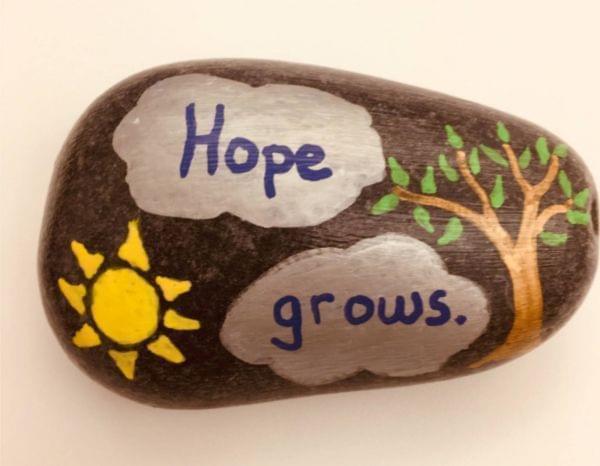CU Trauma & Resiliency Initiative Steps Up Efforts To Promote Healing After Trauma

Volunteers with the CU Trauma and Resilience Initiative painted rocks and placed them throughout the CU area as part of an effort to raise awareness about resiliency. CU Trauma and Resilience Initiative Facebook page
A group in Champaign-Urbana is stepping up efforts to promote healing for those who’ve experienced trauma.
The CU Trauma and Resilience Initiative started off as a group of volunteers supported in part by the Champaign Community Coalition and Champaign County Mental Health Board.
The group focuses on increasing awareness and understanding about how people are affected by traumatic experiences and works to promote community-wide efforts to promote recovery and resilience.
Licensed therapist Karen Simms said the group recently incorporated as a not-for-profit organization in order to build their capacity to do service and advocacy work.
For example, “we have community violence response teams: volunteers who are able to provide short-term support for families who’ve been impacted by community violence,” Simms said. “This allows us to be a lot more intentional about supporting them, engaging them, also recruiting them.”
Simms is taking the lead as the executive director of the new non-profit.
Simms will speak about the changes to the organization at an event at 6 pm on Thurs., Sept. 26, 2019, at the Champaign Public Library.
The event will include a free screening of the documentary “Broken Places,” showcases what people, communities and organizations can do to promote, build and support resiliency and growth following incidents of trauma.
The film screening will be followed by a discussion with the filmmakers about what communities can do to help people who’ve experienced adversity and trauma.
Simms said the entire community has a role to play in helping people who’ve been traumatized by violence and other painful life experiences.
“If I don’t have food and a neighborhood that feels safe, and a safe place to live, it doesn’t matter how much therapy I get,” Simms said. “It’s hard for me to recover from bad things, when I don’t have some of my basic needs, both emotional and practical, met.”
Follow Christine on Twitter: @CTHerman
Links
- Event Aims To Promote Dialogue Among Men About Trauma & Violence
- Exploring The Link Between Racism, Trauma and Mental Health
- Gun Violence, Trauma & Grief; The Old State Capitol’s Legacy; Financial Exploitation
- How Communities Can Support People Suffering In The Aftermath Of Violence
- C-U Rap Group ‘Forever My Brothers’ Promotes Nonviolence Through Music
- Interfaith Vigil In Champaign-Urbana To Provide Space For Grieving, Inspire Action Against Gun Violence
- Memorial Garden In Champaign Will Honor Victims & Survivors Of Gun Violence

